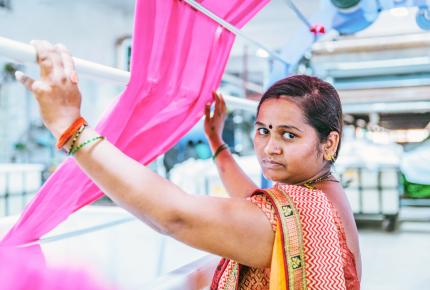
CAN YOU VOUCH FOR EVERY SINGLE STAGE OF YOUR SUPPLY CHAIN?
Consumer expectations have changed significantly in the last few decades, requiring businesses to place a greater emphasis on transparency and social responsibility. By 2025, the millennials primarily responsible for this shift will account for 75% of the workforce. As their spending power grows, businesses across industries will come under even closer scrutiny from a new generation that values responsible production.
However, this challenge also represents a potential opportunity for many companies. Recent reports have found that around 75% of millennials are changing their buying habits based on sustainability concerns – including recyclability, responsible sourcing and ethical product development – and are willing to pay more for sustainably produced products.
When brands ignore customers’ social concerns
In the age of social media, when scandals can go viral in hours, honesty and traceability are key to long-term brand success. Recently, several high-profile retailers faced accusations of employee abuse and running factories with unsafe working conditions. After major news outlets reported the story, it was picked up by social media and high-profile television personalities, becoming a worldwide scandal with dramatic consequences. One retailer saw its operational budget shrink by over 50%, while profits dropped by 11%. The moral of the story: millennials vote with their feet, buying elsewhere if they feel a brand’s supply chain and sourcing ethics are questionable.
Faced with a new generation of consumers actively seeking sustainably and ethically sourced products, brands need to take a closer look at their supply chains. To future-proof their business and win customer loyalty, brands must ensure their products are sourced responsibly, produced under ethical working conditions and have a limited environmental impact. To meet these standards and prove their sustainability credentials, more and more companies are turning to social auditing to ensure compliance both internally and throughout their supply chain.
Using social compliance audits to de-risk your supply chain
Independent social compliance audits help companies understand the key sustainability issues they face and enable them to mitigate risks throughout their supply chain. By undergoing social compliance audits, companies can gain the knowledge and tools to help their suppliers improve, while vastly improving the accuracy of their sustainability reporting. Bureau Veritas uses a range of social compliance standards to evaluate suppliers and ensure conformity at all stages of the supply chain.
Supplier Ethical Data Exchange (Sedex)
This collaborative platform for sharing responsible sourcing data about suppliers allows businesses across industries to tackle issues such as health and safety, sustainability, labor rights and ethical business practices. By helping users map their supply chain, Sedex ensures that companies can make informed decisions to improve their business and mitigate risks. To help businesses achieve compliance, Bureau Veritas offers audits against SMETA requirements, using Sedex’s proprietary auditing methodology to assess all aspects of supplier and supply chain responsibility.
Social Accountability International: SA8000
Based on a management systems approach, SA8000 measures social performance in eight areas: child labor, forced labor, health and safety, freedom of association and collective bargaining, discrimination, disciplinary practices, working hours and remuneration. Bureau Veritas offers SA8000 certification to companies that meet stringent social compliance criteria, helping businesses prove their ethical practices.
Industry-specific standards
Bureau Veritas helps companies evaluate supplier compliance based on a range of industry-specific standards, as well as providing audits to companies’ Code of Conduct requirements. Our experts can audit against numerous organizational standards, including the Responsible Business Alliance (RBA), Pharmaceutical Supply Chain Initiative (PSCI), Aluminium Stewardship Initiative (ASI), Brand Reputation through Compliance Global Standards (BRCGS), Responsible Jewellery Council (RJC), Responsible Minerals Initiative (RMI) and more.
In addition, Bureau Veritas is currently developing its own social audit standard. Thanks to our extensive resources and expertise in labor, social, environmental and health & safety standards, our experts can thoroughly support companies in developing and implementing an effective social compliance program.
With a Bureau Veritas evaluation, clients will receive an audit report and compliance scoring. Our experts can customize the audit to meet company-specific needs, including standards like data protection, anti-bribery, and business continuity, as well as Code of Conduct requirements. Our audit will offer clients a complete overview of supplier risk, as well as shareable proof of compliance to enhance your marketing and communications.
Assuring your company’s future
Faced with a new generation of consumers that takes sustainability seriously and demands responsible social and sourcing practices, forward-thinking companies need to transform. Reviewing, monitoring and improving your supply chain is a crucial first step towards creating a sustainable business that will earn the loyalty of customers for years to come.
1Mullen, Caitlin. Millennials drive big growth in sustainable products, BizJournals.com, December 28, 2018.

